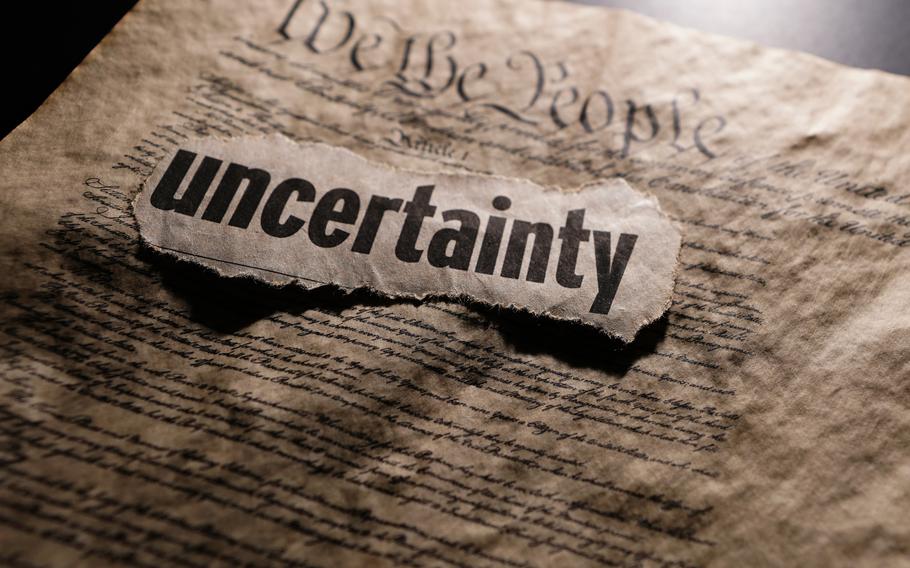
(iStock)
“The country’s going to hell in a handbasket!” I’ve heard more than once. Each time, I recoil and wonder, could it be true? After all, one tap of the smartphone or flick of the television clicker opens up a world of crisis, division, hate, blame and fear.
I see, hear and read reports of protests, riots, and violence committed over hot-button issues plaguing the U.S. — politics, abortion, racism, immigration, foreign policy, climate change, education, economics, terrorism, religion, fossil fuels, the justice system, health care, taxes, foreign policy, LGBTQ+ rights, the military, homelessness, gender identity, reproductive rights, law enforcement, elections, drug trafficking — you name it, people are mad about it.
From all accounts, it appears that we are indeed heaped into that ill-fated handbasket destined for the fiery depths of hell, or at least, economic collapse, war, dictatorship or anarchy, environmental disaster, and the end of life as we know it.
When I allow myself to consider these possibilities, the moment is brief before I reject the thought and tell myself, “No, it isn’t true. We’ll be OK.”
Am I in denial? Is the truth so overwhelming that I just can’t face reality? Are we really on the brink of disaster? Am I naive for having faith in America?
With Election Day coming, and the projected calamities that will befall the United States regardless of which candidate wins, I feel compelled to decide this issue once and for all. I must either begin building a bunker in the backyard, or carry on with life as I have for the past 58 years.
Any threat assessment involves looking back at history. In the 248 years since America declared its independence, it not only survived, it became a leader of the free world. What changed? What happened to lead the U.S. toward the apparent precipice of catastrophe?
In the past, America experienced many of the same crises and trends we see today. In the 20th century alone, Americans endured the Great Depression; the Industrial Revolution; foreign wars; the civil rights movement; gay liberation; “hippie” counterculture; feminist and anti-colonialism movements; and more.
Microchips and semiconductors were invented in the 1950s, but it wasn’t until the internet was foisted upon the public in 1990 that Americans experienced massive social change.
With innovations such as Facebook in 2004 and mobile “smart” devices in 2007, Americans altered the way they worked, communicated and socialized. Furthermore, in the post-pandemic era, people became accustomed to interacting remotely, relying on screens for everything from relationships and health care appointments to education and information gathering.
Today, more than 95% of Americans (as opposed to 66% of people worldwide) have access to the internet, and spend an average of seven hours online each day. Other statistics measuring media consumption (including television, apps, internet and mobile devices) indicate that Americans over age 18 spend almost 60 hours per week consuming media.
Recent studies have found that:
1. Internet algorithms contain filter bubbles and echo chambers that reinforce user biases;
2. Internet users are attracted to opinions that are more extreme than their own;
3. Increasingly biased news sources (traditional and social media) have polarized Americans;
4. Many Americans “believe themselves to be more divided than they really are, resulting in blindness to common ground.”
Clearly, my belief that America will be OK is not the result of denial. In fact, those who believe that America is “going to hell in a handbasket” are the ones with their heads in the sand, or in their screens, as it were. The overconsumption of polarizing and extreme information on the internet, social media and news media have blinded many Americans to the reality we are more alike than we are different. We are all slogging together through life, trying to earn a living, raise children, pay bills, stay healthy, negotiate relationships and have a little fun.
I choose to have faith in our country, our Constitution and the inherent goodness in people. I believe that, no matter who wins the upcoming election, America will be OK. The ideological pendulum may swing, albeit wildly at times, but it won’t fly off the clock.
Time will march on, and American democracy will survive.
Read more at themeatandpotatoesoflife.com and in Lisa’s book, “The Meat and Potatoes of Life: My True Lit Com.” Email: meatandpotatoesoflife@gmail.com